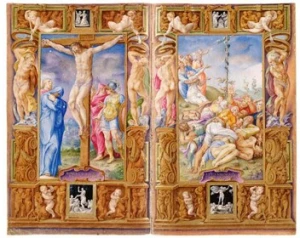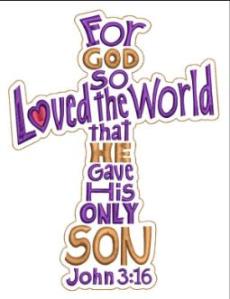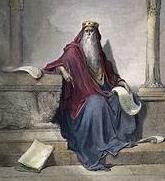John 3:14-21
 May the words of my mouth and the meditations of my soul be acceptable in your sight, O Lord. In the name of Jesus. Amen.
May the words of my mouth and the meditations of my soul be acceptable in your sight, O Lord. In the name of Jesus. Amen.
John 3:16 is one of the most recognizable verses in the entire Bible:
God so loved the world that he gave his only Son so that you who believe may not die but have eternal life.
You can find ‘John 3:16‘ on graffiti walls, football game marquees, car windows or bumpers, and roadside billboards. Even non-religious people know what this verse means. And almost every little child who has attended Sunday School can recite it.
However, additional verses in John 3:14-21 have a deeper meaning, often ignored by most people.
Who doesn’t love the Indiana Jones movie series? Everyone who knows about Indiana Jones knows he hates snakes. He is a robust and tough guy until he meets a slithery thing. Then, he dissolves into a quivering mass of spinelessness. Some people like snakes, keep them as pets, and let them slide about their homes. But these people are definitely in the minority.
Most of us do NOT want to be in the company of snakes. Most of us are right there with “Indiana Jones.” Snakes are slippery and scaly and slimy and scary. Snakes are creatures we do not want to engage with or embrace. Snakes are creatures so different from us that they evoke disgust and fear, even when we do not know if the snake we are looking at is dangerous or a harmless natural insect repellant.
So, we do not readily have a warm, fuzzy relationship with limbless reptiles. We have been conditioned to this hatred, to this fear, since the words of Genesis. In the “second” but earliest Genesis story, the tale of Adam and Eve and their fall from the paradise of Eden, the first “bad guy” is not a guy but a serpent. The serpent later becomes a snake when cursed by God.
Let’s go back and look at the presence of snakes in the Bible. Snakes are often associated with negative symbolism, and their representation usually means deception, temptation, and evil.
- First, we start with Adam and Eve in the Garden of Eden. God created a world with everything to satisfy their needs. It might be called ‘Heaven on Earth’. There is only one condition:
“of the tree of the knowledge of good and evil, you shall not eat” (Genesis 2:17)
The serpent addresses both Adam and Eve; Eve responds, but not Adam. The serpent convinces Eve to eat the fruit from the forbidden tree. God discovered that transgression and the world changed forever. Tempted by Satan in the form of a snake, Eve encouraged Adam to eat the apple, causing their exile from the Garden of Eden and leading to the fall of humanity: God banished Adam and Eve from their paradise, and the serpent changed into a snake.
- Another significant encounter with snakes occurred when the enslaved Hebrews were in Egypt. Moses repeatedly appealed to Pharoah to let them leave, but Pharaoh ignored their pleas. God rained down seven plagues on Egypt, including a plague of insects and frogs.
When Moses and Aaron confronted Pharaoh again, they turned their staffs into serpents to signify God’s power. Pharaoh’s magicians also turned their staffs into serpents. But, Aaron’s serpent swallowed the snakes produced by Pharaoh’s magicians, demonstrating God’s superior control over the Egyptian sorcerers’ magic. However, this did not move Pharoah’s heart.
- In Acts 28:3-5, the native people welcomed Apostle Paul and other prisoners and guards who survived a shipwreck on Malta. As Paul gathered sticks and placed them on the fire, a viper came out because of the heat and fastened itself onto his hand.
When the natives saw the venomous snake hanging from Paul’s hand, they assumed that he must be a murderer and that divine justice served, as they believed he would die from the snakebite. However, Paul shook off the snake into the fire and suffered no harm. The bystanders, seeing that he was unharmed, changed their minds and thought he must be a god
It is important to note that while snakes are often portrayed negatively in biblical narratives, not all references to snakes in the Bible are associated with evil. For instance, the Bronze Serpent in Numbers 21 serves as a means of healing and redemption when venomous snakes bite the Israelites. Additionally, Jesus said of himself:
Just as Moses lifted the serpent in the wilderness, so the Son of Man must be lifted, that everyone who believes may have eternal life” (John 3:14-15),
drawing an analogy to the bronze serpent of Moses’ time.
The snake-bitten people could do nothing to save themselves. God had to provide a way for healing, or they would all die. When they confessed their sins and asked Moses to intercede, God provided this strange remedy:
Make a bronze snake, put it on a pole, and whoever looked at it would live.
We all know what it is like to over-promise and under-deliver. Maybe that’s why it’s so hard for us to believe that God sent Jesus to give us eternal life. Jesus promised so little but delivered so much.
This week’s gospel text is about the revelation of God’s redemptive rescue of humanity for all eternity. Jesus changed all the rules and regulations. In his crucifixion, Jesus was lifted up on a tree and killed horribly in a public manner. And at the place of the ‘skull,’ or ‘Golgotha,’ Jesus crushed the serpent forever for our sins.
Jesus’ death on the cross recalled God’s remedy during the plague of poisonous serpents in Moses’ day, healing those who looked on the bronze serpent. Anyone who looks on Jesus in faith receives eternal life.
We are all under the condemnation of eternal death because of our sins. No human remedy can help; God graciously provided the way to salvation for us. He sent His own Son to be like that snake, lifted in the wilderness.
In John’s Gospel, there are references to Jesus being “lifted up” (John 8:28 and 12:32). Together, these verses speak of two ways Jesus would be “lifted up”:
- On the cross at His crucifixion;
- Similarly, lifted up on a “pole “(i.e., the cross), and repentance and salvation came to all who looked upon Him. Jesus removed the sting of death and preserved us from the “snakebite “of Satan.
- Jesus also spoke of being lifted in His resurrection, ascension, and exaltation. Jesus was “lifted up” from the grave when God raised Him from the dead (1 Corinthians 15:3–4). Jesus was “lifted up” from the earth and returned to heaven after His resurrection (Acts 1:9–14). And now Jesus is “lifted up” over every angel, authority, and power (1 Peter 3:22–23). He sits at the right hand of God, above all creation (Ephesians 1:20–23).
The death of Jesus Christ on the cross was like the symbolic snake raised on the stick that saved the Israelites in the desert. Christ’s death at Golgotha – The Place of The Skull- was a word of forgiveness, grace, and love. From that most terrible place of suffering and death, from that Roman cross meant to be the most humiliating way to die, God used Jesus to save the whole world.
- Jesus Christ crucified was God’s only way of salvation for Jews and Gentiles. In Number 24:4-9, God loved the Israelites and provided a way of healing; in the New Testament, we hear that
“God loves the world,”
that is, Jews and Gentiles, giving His Son for the redemption of His people from every tongue, tribe, nation, and language.
- The serpent was lifted before the Israelites in the camp to heal the bitten. Christ lifted –first on the cross, then in His resurrection, His ascension, and finally in the preaching of the Gospel–so salvation came to sinners who looked on Him.
The cross of Christ is a humbling remedy for our sins. It is humbling to admit that we can do nothing to save ourselves. Jesus did it all. All we have to do is trust in Him. His salvation is by grace (undeserved favor) through faith so that no one could boast they had a part.
This promise is made to us today amid our Lenten waiting. Jesus did not come into the world to condemn it. Already condemned, already dead; from the time of Adam and Eve, we have chosen our desires over God and suffered death. We have chosen to be our gods. We have decided to align ourselves with anything and anyone other than God.
Yet we also hear that God loves the world – the world that has chosen anything but God. The world that would rather die than let God be in charge. But we are the world that God loves.
We know God loves the world; although sin earned God’s wrath and humankind was in a hopeless condition,
-
- God gave His Son as an undeserved gift.
- God gave Jesus up to extreme suffering for the entire world.
Love is how God chooses to judge the world rather than by what we justly deserve. Our discomfort with waiting, our desire for answers, and certainty push us so often towards darkness and death that God should let us suffer. Instead, God gives Himself over to our death-dealing ways. God in Christ is given over to be ‘lifted up‘ and then shows us something new.
God shows us life. Life instead of death – light instead of darkness – healing instead of suffering. It hurts to wait for that promise; it hurts to have those wounds and scars covered over. It hurts to look into that light when our eyes are accustomed to darkness.
As we hear in John 3:16:
God loved the world so much that he gave his only Son so everyone who believes in him may not perish but have eternal life.
That is the God of John 3:16:
A God who loves…
so loves…
the world that He gave his Son.
God’s only Son to a world that wants to die but that now, because of the cross and because of Christ, will find that His death is a life path.
God loves us so much that God will come and be wherever we are to save us. God’s willingness to sacrifice his own Son saves us by grace.
Let us pray:
Is it possible, O God, likely that you can love such as us? Yet we know it is true. If we allowed ourselves to doubt your love, all would be lost. Thank you, God, thank you for loving us. Help us never to betray such incredible love. Amen.
Delivered at Trinity Episcopal Church on Capitol Square, & Ohio Living Westminster Thurber, Columbus, OH; 10 March 2024
Unabridged given at Trinity Episcopal Church on Capitol Square (starts at 29:20)
https://www.facebook.com/stories/10156630596670733/UzpfSVNDOjE0NTQyODE1OTE4NDY2NTk=/?view_single=1
Given at Ohio Living Westminster Thurber
https://youtu.be/Rt40rCcoAfQ?feature=shared (starts at 5:19)
 Today is Maundy Thursday, the least understood, probably least attended, and undoubtedly the most intimate of the Christian holy days.
Today is Maundy Thursday, the least understood, probably least attended, and undoubtedly the most intimate of the Christian holy days.

